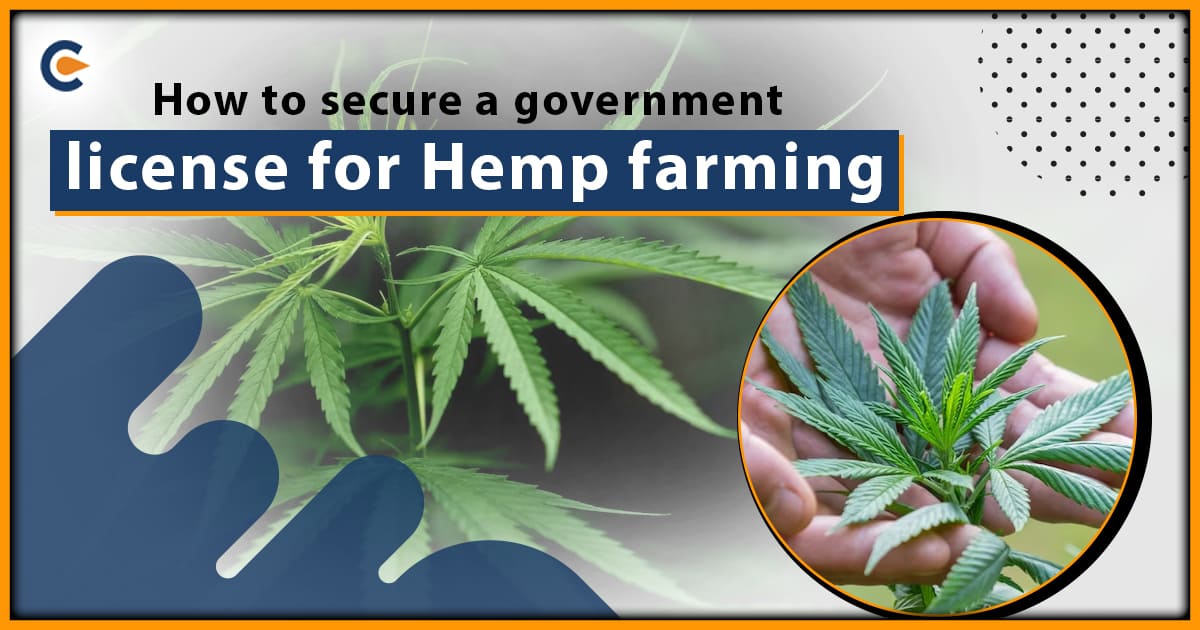Hemp, known technically as Cannabis sativa, is a plant whose stalk, seeds, and flowers may all be used. It is also known as industrial hemp. This Cannabis plant is grown for its edible seeds or for its bast fibre. It is a crop that is organic, environmentally sound, and climate-adaptive. Hemp takes far less water than other crops like cotton and requires no pesticides for nutrient uptake and development. Additionally, it produces more per unit of land compared to other crops. Some people confuse hemp with the cannabis plants that are used to make the drugs, hashish and marijuana.
There are certain urgent concerns to overcome when we discuss license for hemp farming in India. What made India forbid hemp? What time did it occur? What is the status of the ban right now? What are the prospects for hemp products in our nation going forward? Let’s look for the solutions in this article.
What do we mean by hemp farming?
Before we talk about the legal aspects of license for hemp farming in India, it is first important to under the meaning of the term, ‘hemp farming’. Tetrahydrocannabinol (THC), a substance that causes psychoactive effects in humans, is present in small concentrations in the cannabis varieties used to make hemp compared to those used to make marijuana or hashish, despite the fact that all three products—hemp, marijuana, and hashish—contain it. With roots in Ayurveda, a holistic medicinal philosophy that emphasises healthy living practises and the use of herbal treatments to promote wellness, traditional hemp use in India stretches back thousands of years. Ayurveda, which dates back over 3000 years, meticulously describes several hemp plant sections for a range of therapeutic uses. In fact, it is mentioned as one of the five most sacred plants in the Vedas, which are thought to be at least 3400 years old. In India, hemp was traditionally utilised to manufacture natural remedies, wholesome meals, and textile fibre. However, the journey of hemp in India has been a difficult one. We are now starting to witness a new dawn for hemp in India after more than a decade of escalating restrictions and even criminality.
The relationship between India and cannabis dates back thousands of years, with the Vedas listing cannabis as one of the five most holy plants. Wonder plant hemp has the potential to contribute to the textile, automotive, furniture, food, and other sectors. Although identifying its significance in many industries has been a driving force in terms of expanding its licencing, the disagreement over its clear legal standing throughout the world has, in turn, prevented any significant study on it. A number of start-ups in India for dealing in and working with the varieties of this plant were sparked by the United States Senate’s vote to legalise the cultivation, processing, and sale of industrial hemp in 2020. However, the intricate regulatory structure has created many obstacles and issues for the commercial growing of hemp. When it comes to conducting investigations and issuing permits for the cultivation of industrial hemp with THC levels less than 0.3 per cent, the Central Board of Excise and Customs is the controlling body at the state and federal levels.
Hemp and India: Current Legal Status
The state government of Uttarakhand is now the first in India to provide a license for hemp farming. Hemp may be grown lawfully as long as the THC concentration is under 0.3 per cent. The other state that provides license for hemp farming is Uttar Pradesh, and Himachal Pradesh may join the union as a third state shortly. Under Section 14 of the NDPS Act, 1985 (Narcotic Drugs and Psychotropic Substances Act, 1985), Uttarakhand has created a policy for the industrial or horticultural growing of the hemp plant.
However, doing hemp research is not prohibited and it is simple to secure a licence for any place in India. What if someone ignores the prohibition on cannabis farming? It may draw those who would harm or burn the crops.
However, there are promising signals thanks to the establishment of the Indian Hemp Association and the innovative initiatives of several businesspeople. Many states in India have also come forward to legalise hemp farming within their state boundaries, example of such sates have been discussed below:-
- The state of Uttarakhand is the first in the nation to provide a permit to grow hemp plants. Tetrahydrocannabinol (THC) level must be less than 0.3 per cent for hemp to be grown legally. Uttar Pradesh is another state that has made industrial hemp farming lawful. The third state to produce hemp might be Himachal Pradesh in the near future.
- Gujarat’s Suvagarh hamlet in the Amereli district is also home to an industrial hemp farm.
- Industrial Hemp Cultivation in Andhra Pradesh (AP) – A hemp farm is now being established in the small village of Alamuru in the state of Andhra Pradesh. The industrial hemp portion of the 27-acre farm will take up around 15 acres, while the other 12 acres will be used for storage buildings, processing plants, testing facilities, and research and development facilities. The AP government began growing industrial hemp for a variety of uses, including the creation of textile, cosmetic, and medicinal items. However, growing hemp might bring around INR 20,000 per acre for farmers.
- Industrial hemp is also grown in Karnataka, Tami, Naddu, and Rajasthan in India.
Indian Companies Making Hemp-based Products
Following is the list of companies that producing hemp based products in India:-
- Health Horizons, Delhi: This business produces natural goods including shampoos, body creams, and hemp oil.
- Foxxy, Mumbai: Foxxy Couture is a garment brand that combines high design with organic materials. This firm supplies both casual and business attire.
- Hempsters, Hyderabad: Produces all-handmade body care items made from hemp seeds, including soap bars and shower gels.
- Satliva, Bengaluru: This Company sells hemp oil-based skin and body care items with the slogan “Nature is the best Nurture.”
- Greenjams, Vizag: Hempcrete is produced by them to support green structures.
- Vedi, Bhubaneshwar: Vedi creates hemp-based Ayurvedic medications, dubbed “a jewel in the court of Ayurveda” by the company.
Existing law for license for hemp farming
Due to Ayurveda’s rejection of CBD and THC, we are unable to disclose them on the package for this medicine for legal reasons. Second, under Rule 53 of the NDPS Rules, which is the most significant Act in comprehending the legality surrounding CBD. Cannabinol (CBN), a less potent variant of THC, interprets CBD as an extract of the Cannabis plant. As everyone is aware, Uttarakhand has established a policy in accordance with Section 14 of the NDPS Act, 1985[1], which permits the industrial or horticultural growing of the hemp plant.
In the present scenario, any brand or business may manufacture CBD incorporated drugs only with the prior permission from DCGI (Drug Controller General of India)
The facade’s most important rule just came into the open, permitting the hemp seeds in meals. On November 15, 2021, the FSSAI (Food Safety and Standards Authority of India) published a notification that stated: “The hemp seed, hemp seed oil, and hemp seed flour shall be sold as food or used as an ingredient in a food for sale subject to conforming standards.” With the inclusion of hemp seeds in the FSSAI, an increasing number of businesses will enter the hemp market, contributing to the rapidly expanding global hemp sector. Many food items containing hemp seeds and hemp seed oil will join the market and become more widely available throughout the food sector in the upcoming years, providing customers a variety of healthful food options. If we believe the industry predictions, the global hemp business will have a ground-breaking potential graph in the next five years.
Latest development related to license for hemp farming
Hemp serves as a catch-all crop for a variety of ailments and is at the centre of a thriving industry. It is incredibly versatile and may be processed and utilised in the production of a wide range of industrial products, including biofuel and bioplastics, as well as textiles, shoes, food, paper, and medicines. Hemp Seed Oil is beneficial for the skin, and clothing made of hemp fibre is strong and lasts longer than many of its competitors. Numerous Indian businesses are gaining ground on the many applications of this cannabis kind and, with their hemp-based goods, are advocating sustainability and economics.
Although some of the remarkable crop’s advantages have been understood and utilised, these applications have only been in the industrial and medical sectors. The Act made it unlawful and punitive to consume hemp.
Following that, a breakthrough in Indian law allowed businesspeople and entrepreneurs to exhale in relief. The FSSAI announced another exciting development for the hemp business by recognising hemp seed and hemp seed-derived products as food in the Gazette of India, published on November 15, 2021. Considering the advantages of this facility, the industry eagerly anticipated and welcomed this relocation.
2022 FSSAI notified standards about Hemp products
The criteria and information concerning hemp seeds and their ailed products are all made clear in the Gazette of India with this announcement. The following are the specifics.
- The word ‘marijuana’ and any depiction of a cannabis plant component shall not appear on hemp seed goods.
- Any food made from hemp that is for sale shouldn’t have more than 5 mg/kg of THC overall.
- Any hemp seed or food product using it should contain 75 mg/kg of CBD.
- Any beverages made with hemp seeds shouldn’t contain more than 0.2mg/kg of total THC.
- Items made from hemp seeds shouldn’t be identified as CBD-containing or as health items.
- Products made from hemp seeds shouldn’t be identified as vitamins or health items with psychoactive properties.
- Any hemp seed product intended for children under the age of 24 months cannot be produced, sold, or imported.
What are the eligibility criteria to secure license for hemp farming?
The following points talk about the eligibility criteria for licence for hemp farming in India:
- Land must be owned outright.
- Any business or academic institution with land ownership is eligible to apply.
- Get yourself GMP certified
- The premises needs to be timely inspected by the assigned inspectors
Forms required for Hemp farming in Uttarakhand
| S. No. | Form | Description |
| 1 | IHC – A1 | To apply for the license. |
| 2 | IHC – A2 | For assurance of mass storage and use. |
| 3 | IHC – 1 | Format of license to be issued to farmers dealing in industrial hemp. |
| 4 | IHC – 2 | Format of license to be issued to farmers for industrial hemp storage, use and sale. |
| 5 | IHC – 3 | Format of license for storage and use of industrial hemp. Applicable to industrial units only. |
| 6 | IHC – 4 | License for transportation of industrial hemp. Applicable to industrial units only. |
Conclusion
Currently valued at USD 2–3 million, the Indian hemp market is expected to rise to USD 500–700 million in the following years. The only state in India to allow for the commercial hemp farming is Uttarakhand. The states of Himachal Pradesh and Rajasthan are also expected to shortly begin legal hemp farming, although for the time being, Uttarakhand is the only local provider.
During the COVID 19 shutdown, the hemp industry grew. In India, there are roughly 100 hemp start-ups. Given that the global legal cannabis market was estimated to be worth USD 12.8 billion in 2021 and is anticipated to reach USD 48.3 billion by 2028 (at a CAGR of 24.80% over the forecast period), the recent Food Safety and Standards Authority of India (FSSAI) notification that states that hemp seed, hemp seed oil, and hemp seed flour can be sold as food or as an ingredient for food is a welcome move. India’s hemp farming would undoubtedly benefit from the FSSAI notice.
Even though hemp production is only permitted in a small number of states, things are off to a promising start. It would be wise for other state governments to think about doing the same. Entrepreneurs need to find novel methods to use this wonder crop.
Read our Article: How To Start Biomass Pellet Manufacturing Business?











